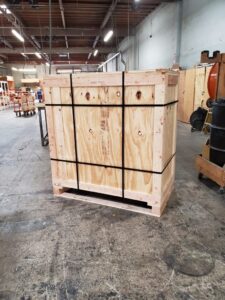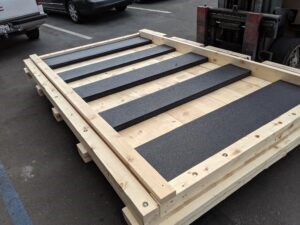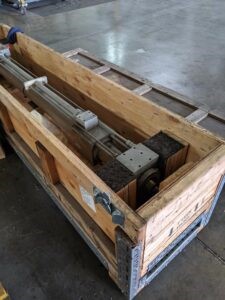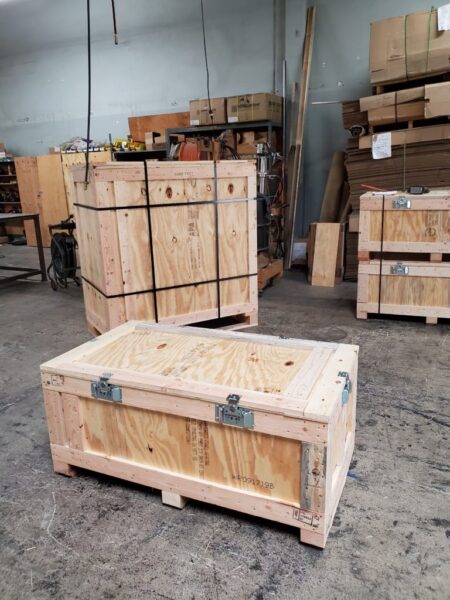In today’s fast-paced world, safe and efficient packaging is crucial in various industries to ensure optimal product quality and protection. Among the numerous packaging options, heat-treated crates are an increasingly popular choice due to their many advantages. In this post, we’ll explore the benefits of heat-treated crates, their applications, and examine the heat-treated crate market in the USA.
Understanding Heat Treatment
Heat treatment is a process that involves subjecting wood to high temperatures to eliminate pests and pathogens. In the context of crates, this process adds a layer of durability and protection, making them a preferred choice for international shipments. Compliance with ISPM 15 regulations ensures global acceptance.
Advantages of Heat Treated Crates
The primary benefits of using heat-treated crates in packaging can be grouped into three main categories: enhanced product safety and protection, compliance with international regulations, and cost-effectiveness and sustainability.
Enhanced Durability and Strength:
- Heat-treated crates exhibit heightened resistance to wear and tear, guaranteeing the safe arrival of your cargo at its destination.
- Increased durability ensures longevity, making heat-treated crates a cost-effective and reliable choice for various shipments.
Protection against Pests and Pathogens:
- The heat treatment process serves as a robust defense, eradicating the risk of transporting unwanted pests and pathogens.
- By ensuring a pest-free environment, heat-treated crates safeguard both your products and the ecosystem, aligning with sustainable and responsible shipping practices.
Eco-friendly and Sustainable Packaging Option:
- Choosing heat-treated crates reflects a commitment to eco-friendly packaging solutions.
- This natural process enhances wood durability, reducing reliance on chemical treatments, and contributing to overall sustainability in the packaging industry.
Compliance with International Shipping Standards:
- Adhering to ISPM 15 standards is pivotal for seamless international shipping operations.
Heat-treated crates guarantee compliance with these regulations, providing a hassle-free experience and eliminating potential delays or complications at customs checkpoints.

Applications and Industries
Heat-treated crates have become increasingly popular in various industries, including agriculture and food production, pharmaceuticals and healthcare, and automotive and manufacturing sectors.
Suitable Industries for Heat-Treated Crates
Industries such as agriculture, pharmaceuticals, and electronics benefit from the protective qualities of heat-treated crates.
- Delicate Electronics: Sensitive electronic equipment, ensuring safe transit with the robust protection provided by heat-treated crates.
- Perishable Agricultural Goods: Fresh produce and agricultural products, safeguarded against external elements during transportation.
- Heavy Machinery: In the realm of manufacturing and automotive industries, heat-treated crates secure the transportation of heavy machinery.
- Medical Equipment: Critical medical instruments and equipment, stored and transported securely to ensure their integrity.
- Fragile Glass and Ceramics: Items prone to breakage, such as glassware and ceramics, benefit from the protective cushioning of heat-treated crates.
- Cosmetic Products: Delicate cosmetic items, where ensuring the pristine condition upon arrival is paramount.
- Food and Meat Products: Ensuring the safe transport of perishable food items, including meat products, in optimal conditions.
- Automotive Parts: Various components and parts crucial to the automotive industry, reaching their destination intact with the help of heat-treated crates.

ISPM 15 Documentation
- Explanation of ISPM 15 and Its Significance:
- Providing a comprehensive understanding of the International Standards for Phytosanitary Measures (ISPM 15) and elucidating its critical role in facilitating smooth international shipping operations.
- Requirements for Documenting Heat Treatment:
- Offering insights into the essential documentation prerequisites to ensure meticulous adherence of your heat-treated crates to the stringent standards outlined by ISPM 15.
- Ensuring Compliance with International Shipping Regulations:
- Delivering guidance to businesses on the strategic measures required to guarantee absolute compliance of their heat-treated crates with the intricate web of international shipping regulations.

Choosing the Right Heat Treated Crates
- Factors to Consider When Selecting Heat-Treated Crates:
- Delve into the critical considerations, ranging from size and weight capacity to customization options, guiding businesses in making informed choices when selecting the ideal heat-treated crates.
- Customization Options Available:
- Explore the flexibility of heat-treated crates in catering to specific shipping needs, ensuring a seamless fit for various products. Understand the array of customization options available for tailored and efficient packaging solutions.
- Comparison with Other Crate Materials:
- Conduct an unbiased comparison between heat-treated crates and alternative materials, aiding businesses in making strategic packaging decisions. Provide insights into the unique advantages offered by heat-treated crates in contrast to other crate materials.

Environmental Impact
Heat-treated crates stand as a beacon of eco-friendly packaging solutions, with their natural heat treatment process significantly contributing to environmental sustainability. This inherent characteristic not only ensures the protection of the shipped goods but also minimizes the ecological footprint associated with traditional packaging methods.
In direct comparison with conventional crate materials, the environmental impact of heat-treated crates emerges as notably superior. By opting for heat-treated crates, businesses actively reduce their reliance on chemical treatments and endorse a more sustainable alternative. This conscious choice reflects a commitment to environmental responsibility, emphasizing the significance of transitioning away from less eco-friendly packaging practices.
Conclusion
In concluding this extensive guide, heat-treated crates emerge as more than containers—they become the vigilant guardians of your products in the complex world of international shipping. From heightened durability to eco-friendly practices, these crates redefine packaging standards.
Notably, BlueRose Packaging embodies this transformative approach. Beyond a provider, it stands as an innovative force, reshaping packaging norms. With a commitment to quality and sustainability, BlueRose Packaging ensures each crate carries not just products but a promise of unparalleled care in the global journey of your shipments. Choose BlueRose Packaging for a future where packaging is a strategic advantage, not just a necessity.
FAQs (Frequently Asked Questions)
Q. How does the heat treatment process work for wooden crates?
A. The heat treatment process involves placing wooden crates in a chamber, raising temperatures to specific levels, and maintaining them to eliminate pests, reduce moisture, and prevent mold.
Q. Are heat-treated crates reusable?
A. Yes, heat-treated crates are designed for reusability, offering a cost-effective and sustainable packaging solution.
Q. Do heat-treated crates comply with international shipping standards?
A. Absolutely, heat-treated crates adhere to the International Standards for Phytosanitary Measures 15 (ISPM 15), ensuring smooth international shipping.
Q. Are heat-treated crates harmful to the environment due to the heating process?
A. No, the heat treatment process is eco-friendly, eliminating the need for chemical treatments and minimizing environmental impact.
Q. Are heat-treated crates only suitable for specific industries?
A. Not at all, heat-treated crates find applications in various industries, from agriculture and food production to healthcare and manufacturing.
Q. Do heat-treated crates require additional certifications for international shipments?
A. Generally, heat-treated crates with the ISPM 15 stamp fulfill international certification requirements.

